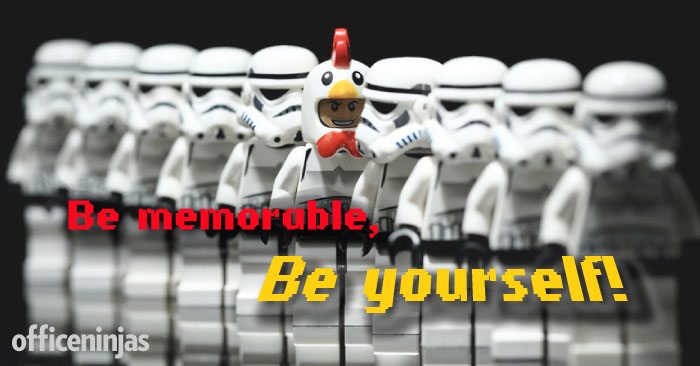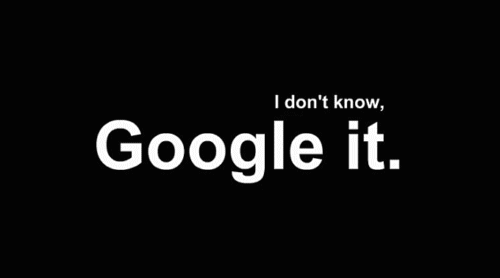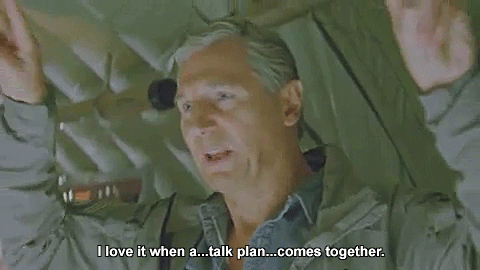Define Your Personal Brand—Don’t Let Your Job Tell You Who You Are

Companies are really starting to see the value in employees as individuals, rather than just cogs in a wheel. Individuality is becoming celebrated in the workforce, rather than simply tolerated (at best).
A few years ago, I worked in recruitment and gained a lot of insight into the internal processes of a range of companies. Never quite the corporate type, I played the role pretty well. I wore the suit, talked the talk and walked the walk… albeit not in stilettos after that first day, when I fell down the steps and on to a client. And that’s not a typo, I actually fell on to a client! I was good at my job, people liked me and I was successful, but I felt smothered.
I was being defined by my job title, the perceptions my colleagues and clients held of me, and the associated assumptions made with regards to who I was. You see, I wasn’t just a suit. I loved indie music and tattoos and lifting heavy-ass weights. I didn’t like tea or coffee and I hated how awkward that made meetings—”Can I have a water, no sugar, please?” Sure, I liked recruitment, but I had a life outside of it and I couldn’t figure out how to blend the two.
This is where the importance of personal branding comes in to play.
Have you ever heard the saying “If you’re not in the game, you can’t win”? Well that also applies to your career, because if you’re not in control of your online presence then you’re not in the game. Having a personal brand will help you when it comes to job promotions, industry recognition and networking. With millions of awesome office ninjas around the world, it’s essential to stand out, and I’m here to help you do just that. So let’s get started!
Google Search Your Name Right Now!

Go on, I dare you, and try not to have a heart attack in the process. If you’re lucky, you’ll be invisible, but even that’s hardly desirable; your online brand is similar to your credit rating and not having one is just as bad as having a terrible one.
If you’re not invisible, then it’s time for some damage control—and maybe some bribery. It once took me 24 hours of whatsapping (that’s a word, honest), two free drinks and a lot of pleading to get a friend of mine to take down a less than complimentary photo of me that she posted on Instagram. Why was she was reluctant to remove it? Because she looked so darn hot in it. To be brutally honest, it was such a bad photo of me that it would have made Beth Ditto look like Penelope Cruz (I have all the love in the world for Beth, but lets be real—she’s no Spanish Senorita)!
Decide Who You Want To Be

After you’ve Sherlocked yourself on Google, it’s time for the fun part. You get to decide, right here and now, who you want to be. You get to decide, not your boss, not your colleagues and not your clients. The first thing you have to do is nail down a few business objectives, which means sitting down with a pen and paper and asking yourself the right questions:
- What are your career goals?
- What sets you apart?
- Do you want to be seen as an authority in your niche?
- Do you have an awesome talent that no one knows about?
- Perhaps you have a personal passion that you’d like to turn into a career?
- What do you want to be doing in 5 years time?
- What do you want to say and whom do you want to say it to?
Building your personal brand is about defining your objectives and making a plan to achieve them. Once you’ve done that, it’s time to let the world know—and here’s how.
Enact Your Plan

LinkedIn is the MTV Cribs of the corporate world. It’s the place to showcase your talents, your abilities, your personality and your experience. Plus, you get to put up a kickass photo of yourself too (but please… not a selfie, I’m begging you). The key to LinkedIn is to use it daily, try to connect with key influencers in your industry, and expand your network.
Interested in a promotion? Connect with your new potential boss. Interested in a new job? Connect with the hiring manager and show your interest. And if you’re sending out your resume, always, always supply your LinkedIn details (seriously).
If your Twitter handle is your actual name, you’d better start spring-cleaning pronto. Your old posts from 2009 won’t necessarily show up on Google search, but that’s a risk you don’t want to take—trust me!
If you don’t use your Twitter for business purposes, that’s fine, but I suggest changing your handle to something that gives you more anonymity. And if you do intend to use it to promote yourself online (good call!), then you need to have a balanced mix of both business and personal commentary. That’s not to say you have to think twice before every tweet you make, but you should always have your branding objectives in the back of your mind.
Personal Website/Blog
A great way of drowning out any unwanted online reference is to SEO it to death. What I mean is, push it down to the bottom of Google Search by giving the bots much more juicy and relevant brand associated content to focus on. This way, all of the good stuff will rise to the top!
To do so, you need to create quality content on a regular basis. The best way of doing this is to set up a personal blog. It doesn’t have to be about your job. It can be about anything you want (within reason)! Choose something you’re passionate and knowledgeable about, start writing, start sharing, and watch your brand grow—along with your self-confidence!
So what are you waiting for? Get yourself out there and show the world what you’re made of. Show the world YOU. You’re not just an admin, you’re not just an office manager and you’re not just a PA—you’re a multitude of talents all wrapped up in a freakin’ badass office ninja and it’s time for you to be unleashed!
How do you manage your personal brand?